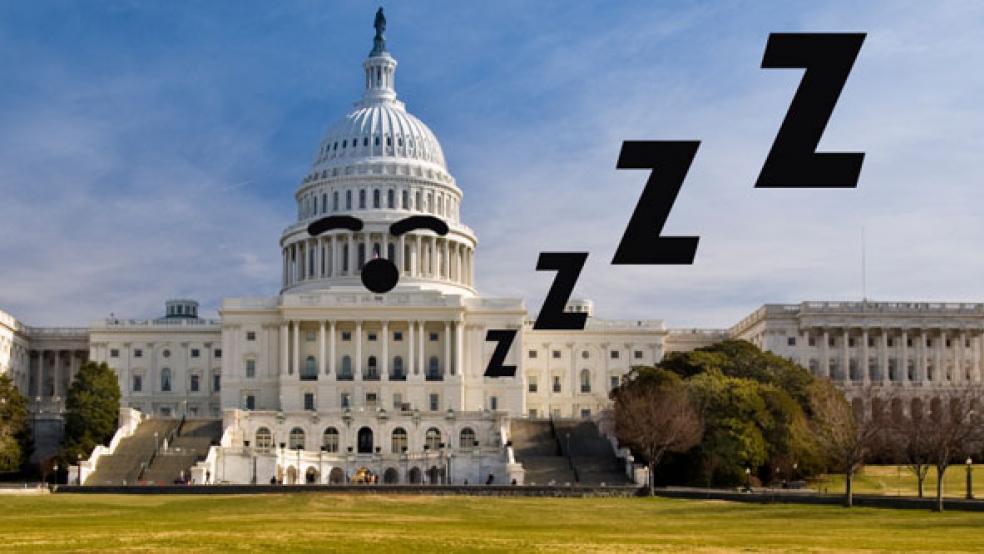One of the rarely spoken byproducts of the do-nothing Congress has been a decline in special interest spending on lobbying and influence peddling.
The political dynamic is fairly straightforward: A sharp decline in the number of bills passed in a given year equals a corresponding decline in billing by K Street lobby shops and assorted strategic policy advisers. There is little doubt that the past few years of partisan warfare and legislative gridlock have been bad for the city’s high-priced lobbying firms, after a banner decade of growth and jaw-dropping profits.
Related: Voters Give a Thumbs-Down to Their Own Lawmakers
The 113th Congress passed fewer substantive bills last year than any other Congress in two decades -- just 55 laws compared with 63 in 2011, the first year of the 112th Congress, which itself was one of the least productive in recent history, according to an analysis by the Pew Research Center.
Last year, for the third year in a row, Washington’s top, gold-plated lobbying organizations saw a decline in revenue. The city’s 10 largest firms reported a collective 1 percent decline in lobbying revenues compared to 2012 revenues – a drop from $228.9 to $226.3 million, according to the Washington Post.
The biggest declines came from Patton Boggs, a lobbying powerhouse, which saw revenues decline 13 percent, to $40.2 million, from the previous year; the Podesta Group, down less than 1 percent to $27.3 million; Brownstein Hyatt, down 2 percent to $22.2 million; Van Scoyoc Associates, down 5 percent to $21.4 million, and K&L Gates, down 5 percent to $16.3 million.
While the latest revenue decline was far less than the 10 percent collective drop reported a year ago, “it indicates that Congress’s lack of productivity in 2013 continues to be a drag on an industry whose business is so closely tied to government action,” the Post noted.
Industry-wide, the impact of a dysfunctional and highly unproductive Congress has been far more dramatic and damaging to the city’s lobbying fraternity. Overall spending on lobbying in Washington totaled $2.38 billion last year – down $1.17 billion from the record high of $3.55 billion in 2010, according to figures compiled by the Center for Responsive Politics, a watchdog group. During that same period, firms were forced repeatedly to lay off employees. The number of registered lobbyists shrank from 12,966 to 11,935 during that period.
Related: Lobbying Groups Ramp Up War on Obamacare
Not surprisingly, the lion’s share of the billions on lobbying was spent to influence health care and financial services legislation amid raging controversies over the Affordable Care Act and the Dodd-Frank banking and financial services reforms.
The Hill reports that K Street lobbyists are racking up frequent flyer miles with regular trips to Silicon Valley in search of clients. “They are trading power suits for California casual to cash in on the explosive growth of technology lobbying, which has more than doubled over the past decade and shows no signs of slowing down,” the newspaper said.
House Speaker John Boehner (R-OH) doesn’t apologize for Congress’s dismal legislative record. In fact, he boasts about it. Late last fall he told reporters he was proud of putting a brake on tougher regulations on business and efforts by President Obama to push a more liberal agenda on the country.
“Listen,” Boehner said, “we have a very divided country and we have a very divided government. And I’m not going to sit here and underestimate the difficulty in finding the common ground, because there’s not as much common ground here as there used to be.”
He might as well have taken a bow for slowing the growth of special interest spending that has permeated every facet of government today.
Top Reads from the Fiscal Times:





